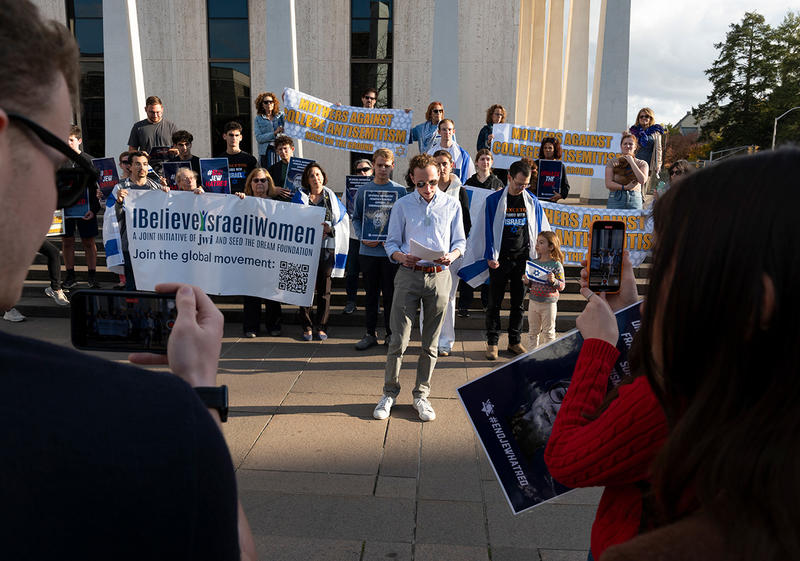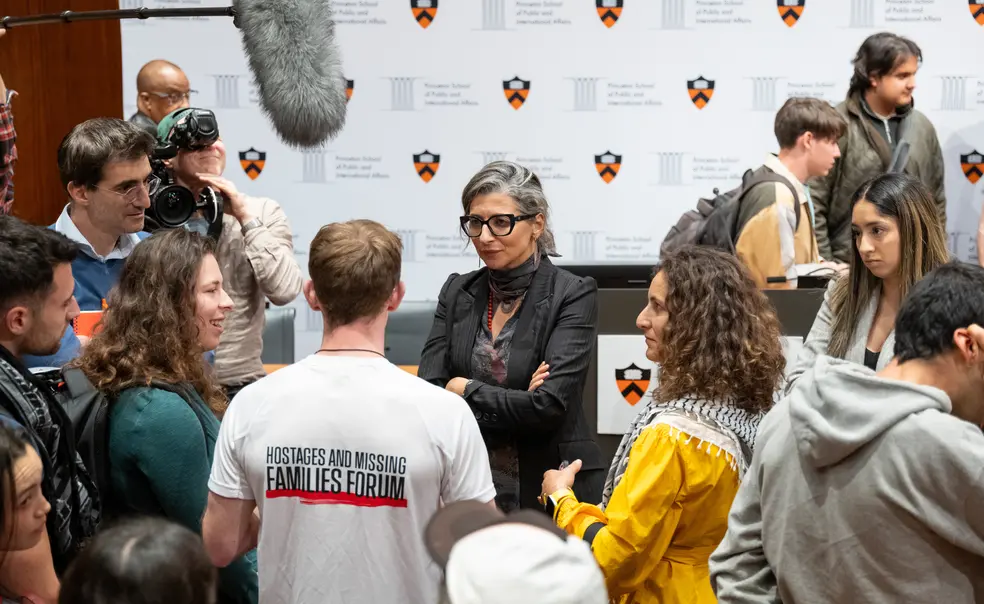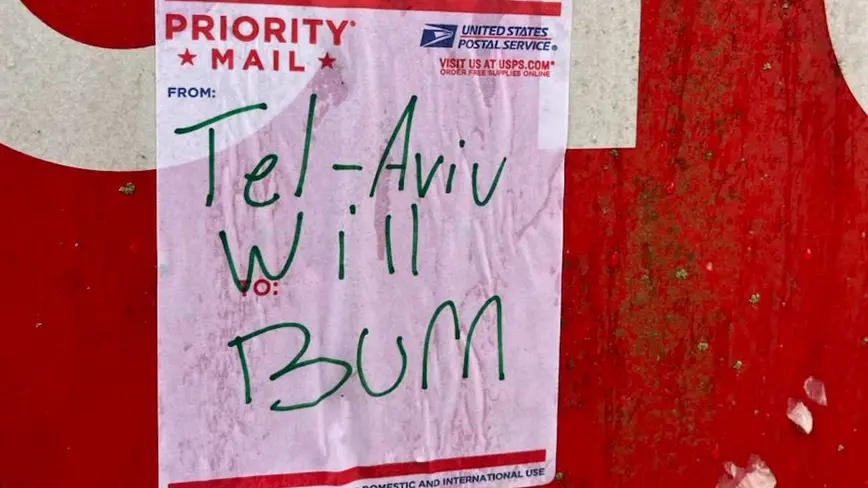SPIA Event Featuring UN’s Francesca Albanese Draws Heated Debate
The human rights expert sparred with protesters about the conflict and the future of Israel and Palestine
Princeton students and community members engaged in heated arguments with Francesca Albanese, an Italian human rights expert, during an event hosted by the School of Public and International Affairs on Tuesday.
Albanese was appointed to her position, United Nations Special Rapporteur for the Occupied Palestinian Territories, in 2022. She has been criticized for attending a conference hosted by Hamas’ Council on International Relations in 2022 and was condemned by the United States, France, and Germany for a 2014 comment that resurfaced in 2022 in which she characterized the U.S. as “subjugated by the Jewish lobby,” playing into an antisemitic trope.
Albanese visited campus as a part of the Dean’s Leadership Series, which also stirred controversy this semester when it hosted the President of the Maldives, who has banned Jewish Israeli citizens from entering the country.
Before Tuesday’s moderated discussion started, Tigers for Israel hosted an anti-Albanese, pro-Israel protest on the steps of Robertson Hall. Maximillian Meyer ’27 spoke to the crowd about how Albanese and the Maldivian president speaking at Princeton “confers the prestige of Princeton” onto these speakers.

The event was held in the Arthur Lewis auditorium of Robertson Hall, which has a capacity of 189. Almost every seat in the auditorium was filled.
The moderator, SPIA professor Razia Iqbal, began by asking Albanese about her recent report for the UN titled “Genocide as colonial erasure” on “the situation of human rights in the Palestinian Territories.”
Before answering, Albanese gave a land acknowledgement to the Lenni Lenape, a Native American tribe on whose ancestral land Princeton stands. “I recognize the profound injustices endured by Native Americans here and in other places around the world like Palestine,” Albanese said, noting that these injustices are often overlooked.
“It would be less challenging if institutions like universities and places where knowledge is created and disseminated were actually committed to addressing and unraveling the colonial past,” she continued.
At the same time Albanese was speaking, several community members holding Israeli flags and sitting in the back of the auditorium began speaking. “You’re a liar! A liar!” one person yelled. “It’s a bunch of garbage and you know it!” another added.
After a few moments, the community members got up. “We couldn’t bear to listen to it,” a woman wearing a keffiyeh with Stars of David on it told the room. “We’re leaving.”
After that interruption, Iqbal asked Albanese how she came to her conclusions in the report without being able to go to Gaza or the West Bank to conduct research.
“Let’s say it’s undeniable that certain acts have been committed,” Albanese said, noting that satellite imagery shows farmlands, fishing boats, and most buildings in Gaza have been destroyed. “This is utterly, utterly illegal, and this is a war crime."
She added: “This is beyond a military object, this is a political objective and should have been questioned from the beginning."
Iqbal noted that war crimes and crimes against humanity can take place without a genocide. “To prove intent by an individual of genocide is hard enough, but to prove that a state has the intent to commit genocide is even harder,” Iqbal said, pressing Albanese again on how she concluded that Israel has genocidal intent in its military operation in Gaza.
Albanese, whose responses often touched on many topics, argued that to Israel, “Palestinians have been felt [sic] like an encumbrance,” and presented as an existential threat to Israel. “No one here is calling for the destruction of Israel here,” she added.
“Problem is this, that Israel was created as a Jewish state, and therefore it can only survive with this demographic majority,” Albanese said. “The Palestinians, with their stubbornness, doesn’t matter how you humiliate, how you deprive them, how you must arrest them. You must incarcerate them, including their kids. You demolish their homes. They sleep under the rubble ... because for the Indigenous people, the land is not where they live. The land is who they are.”
Albanese then turned to Palestinian resistance, arguing that oppression, when violent, generates more violence. Later in the conversation, when discussing the founding of Israel, Albanese noted that after the Holocaust, Jews were not permitted into the United States or United Kingdom as refugees.
“Back then, colonialism was accepted, it was kosher,” Albanese said. “However, we need to recognize that years later that it happened at a huge cost for the Palestinians.”
She added that 750,000 people were forced to leave their homes, and, “How can you correct an injustice by making another injustice?”
Just before taking questions, Iqbal asked Albanese about the accusations of antisemitism that have been leveled against her.
“It’s not been said only about me, it’s been said about anyone criticizing Israel. Again, Israel has a track record as a serial violator of international law. It has nothing to do with the Jewish people,” Albanese said.
Meyer had the opportunity to ask a question but began by listing allegations of antisemitism against Albanese, including a social media post in February in which she responded to French President Emanuel Macron’s assertion that Oct. 7, 2023, was the “largest antisemitic massacre of our century” by saying victims were killed not because they were Jewish, but as a response to Israeli oppression.
During the exchange, which became tense, Iqbal told Meyer to ask Albanese a question. “My question ultimately is, how dare you compare Jews to our oppressors?” he said.
In a winding and unclear answer, Albanese mentioned both Nazi Germany and Israeli Prime Minister Benjamin Netanyahu before saying she would never mock the French president.
“At the very end, [Macron] was saying, once again, that Oct. 7 was the largest attack since the Holocaust. First of all, it’s not true in terms of numbers, because more Jews have been killed by the Argentinian junta than those who have been killed on Oct. 7. But this doesn’t matter. It’s just to be very pedantic.”
The military junta of Argentina, which ruled from 1976-1983 did disproportionately target Jews, who were less than 1% of the population but represented about 12% of the deaths (3,000). However, Oct. 7, 2023, was the deadliest single day for Jews since the Holocaust.
To conclude the event, Dean Amaney Jamal asked what Albanese sees as the path forward for peace and reconciliation in the region.
That path is for it “to be a shared land,” she said.
“I don’t think that there will be any way to move forward without Israelis coming to terms with the fact that they cannot lead by subjugating the Palestinians. And the Palestinians, there is no way that Palestinians leave that land, unless genocide, is the only way left for Israel to eradicate the Palestinian presence,” Albanese said, concluding that it is something that Israelis and Palestinians will have to decide.













6 Responses
Richard M. Waugaman ’70
1 Year AgoPro-Israel Lobby’s Influence on Policy
Your article states that Albanese “characterized the U.S. as ‘subjugated by the Jewish lobby,’ playing into an antisemitic trope.” I beg to differ. John Mearsheimer and Steven Walt, in their 2008 book The Israel Lobby and U.S. Foreign Policy, presented overwhelming evidence of the power of this lobby (which is backed by some Christian fundamentalists, not just by Jewish Americans). With polls showing the majority of Americans against providing weapons that Israel has used to kill more than 40,000 Palestinians (according to numbers published by the U.N.), and with AIPAC pouring millions of dollars into campaigns to defeat politicians who support the human rights of the Palestinians, it is cynical in the extreme to denounce the truth Albanese spoke as nothing more than “an antisemitic trope.” No, calling the truth “antisemitic” in this instance instead reflects Islamophobia.
Ron Cohen ’77
1 Year AgoLobbying Is Not ‘Subjugating’
Richard, ironically your comments here actually represent amplification of the antisemitic tropes you (erroneously) claim to be substantiated. There is a critical difference between being one among many effective lobbying groups across a vast number of constituencies and “subjugating” the U.S. Your language is in fact another form of antisemitic libels (e.g. “Jews control the world” or “Jewish space lasers”) that have been wielded to justify persecution and mass murders of Jews.
As to your comments about Israel killing “more than 40,000 Palestinians,” you have uncritically adopted Hamas’ reported numbers, whose accuracy are not only suspect, but which do not differentiate between military personnel and civilians. Israel estimates more than 18,000 Hamas fighters killed, with a resultant civilian to combatant ratio of close to 1:1, which is among the lowest of any war ever, even though Hamas deliberately uses its civilians as human shields.
John Hockenberry ’69
1 Year AgoProvide Time for Dissenting Voices
On Oct. 29 Princeton’s School of Public and International Affairs hosted a talk by Francesca Albanese, the UN’s “Rapporteur” for Human Rights in the Palestinian Territories, in Robertson Auditorium. According to The Daily Princetonian, during her talk there were several outbursts from members of the audience as well as a “contentious exchange” with a representative from a pro-Israel student group, but fortunately no more serious incidents.
Certainly Princeton should not shy away from having speakers on campus who may express controversial or even extreme points of view. And Ms. Albanese, in spite of her UN connection, is just such a speaker. She has a totally one-sided view of the very complicated Palestinian situation and sees Israel as the sole villain and obstacle to peace. Indeed, in a 56-page report released before her Princeton talk, UN Watch, a Geneva-based human-rights organization, documented numerous inflammatory, antisemitic, anti-Israel and false statements Ms. Albanese has made regarding the ongoing Israeli-Palestinian conflict and recommended that the UN terminate her employment. And a day after her talk at Princeton Ms. Albanese gave a speech at Barnard College in which she repeated the claim she made at Princeton that Israel’s war against Hamas constituted “genocide” and went on to question Israel’s right to even exist.
The fundamental problem here is that Princeton gave Ms. Albanese an official platform to express her views without providing any mechanism by which those views could be challenged by another subject-matter expert who disagreed with her. An ideal approach would have been a two-person debate between advocates for each side of this conflict moderated by members of the SPIA faculty. Failing that, at a minimum the University should have scheduled a knowledgeable individual with an opposing point of view to speak shortly after (or before) Ms. Albanese’s talk. I am profoundly disappointed that, as far as I know, no such speaker was scheduled.
It seems to me the failure to give its students an opportunity to hear from both sides of an important and controversial issue is not only inconsistent with the core educational mission of the university but also creates an impression the University is endorsing the views of the speaker it did provide a platform for. I very much hope that, going forward, Princeton will have the good sense to structure events so that dissenting voices are given an equal opportunity to be heard.
Ron Cohen ’77
1 Year AgoSPIA Owes More to Its Audience
Ms. Perry did a good job of providing a balanced view in her report. However, it is troubling that the Princeton SPIA dean’s “leadership” series saw fit to invite a “UN rapporteur” who has never led any organization, and who has long trafficked in antisemitic and anti-Israel canards. She has rationalized — to the point of justifying — terrorism, and she has cast doubt on the rapes that Hamas inflicted on Jewish women on Oct. 7. In March 2024, on International Women’s Day, Albanese trivialized the atrocities committed by Hamas on Israeli women, and condescended to them as follows: “My thoughts also go to the Israeli women, especially the soldiers: what have you done, what have you become. Dears, when you realise [sic] it, you will be haunted forever.” She has been condemned for antisemitism by both Germany and France, and respectively by the U.S. ambassadors to the UN and to the UN Human Rights Council.
At a minimum, the SPIA owed it to its student audience to provide an informed counterpoint, in a debate format. In my freshman year, 1973, the Whig-Clio Society hosted a debate between physicist William Shockley, who espoused highly charged racial views, and anthropologist Ashley Montagu, whose field of study was race. Shockley’s presence on campus was controversial, but the debate format provided students with a balance of arguments and information that they could use to better calibrate their own views and seek further learning on their own.
Instead, SPIA provided Albanese with the legitimacy of its “leadership” designation and afforded her a platform from which to spew her antisemitic tropes and distorted renderings of history, unchecked by a debate format or even real-time fact-checking by a moderator expert in the subject matter.
Linda Seltzer *91
1 Year AgoInvite Speakers to Provide Balance
I don’t see how your publication can call someone with these views on Israel a human rights expert. Israelis have human rights too.
If Princeton is going to invite a speaker on the Middle East, why don’t they invite an actual diplomat, such as the US Ambassador to the UN, or Dennis Ross, an experienced and knowledgeable diplomat?
What’s missing from the discussion in the mass media is what Palestinian leaders are willing to compromise on in order to achieve peace, rather than an ongoing saga of superficial epithets and rhetoric.
If the University is serious about free speech and balance, then is this University forum going to invite Hillel Neuer of UN Watch and also publish his research on the speaker described in this article?
Robert Hill ’00
1 Year AgoA Poor Fit for Dean’s Leadership Series
Ms. Albanese is certainly entitled to her views, and there may have been an appropriate forum for her to speak on campus, but the SPIA Dean's Leadership Series was not it. Other speakers in the series have been leaders of countries, organizations, and business units. I am unaware of any leadership positions held by Ms. Albanese, and nowhere in the video of her appearance posted on the SPIA website does she speak of the kinds of complex problems facing decision-makers in the real world — presumably the point of this series. Rather, in her talk, everything is a black-and-white morality tale, and inconvenient facts matter less than sweeping anti-Zionist generalizations.
PAW’s writeup here was good, but some further details of her talk show how ill-advised the invitation extended to her was. I was struck by how Ms. Albanese refused to engage with precise definitions of genocide, and deal with actual facts on the ground, waving such details away as “semantics.” One thing that was especially galling was how, at the 35-minute mark or so in the SPIA video, Albanese explicitly says that annexation, even de jure annexation, is like rape, and that, in that context, “everything was permitted to Israel.” This is quite extraordinary — the only Palestinian area ever de jure annexed by Israel is East Jerusalem, in 1980. Was the formal annexation of East Jerusalem in 1980 truly a “rape” where “everything was permitted to Israel”? If so, then no wonder that she minimizes Hamas’ sexual violence, as Max Meyer ’27 has claimed — the word “rape” means nothing, if it can mean anything.
Meanwhile, at minute 39 or so, she makes an unclear reference to a nation that is “stingy and stubborn” (to laughter from the interviewer). Her willingness to traffic in lazy national stereotypes comes through loud and clear. She closes the lecture by speciously claiming that early Zionists said, “Let us colonize Palestine the way the French colonized Algeria and the Brits have colonized India,” followed by the extraordinary declaration that “antisemitism is a European thing, because racism is a European thing.”
Her patent wholesale dismissal of non-European antisemitism is ahistorical but explains her absurd declaration in the interview’s question period (not captured in the SPIA video) that Hamas is not motivated by antisemitism. Finally, in response to the question asked by Max Meyer ’27, it should be noted that she ended by asserting that his alleged indifference to Palestinian suffering “speaks to your humanity” — to applause from her admirers in the room.
Ethnic stereotypes, completely ahistorical claims, and ad hominem attacks on undergraduates: Is this the stuff of “leadership through mentorship,” the alleged mission of the SPIA Dean’s Leadership Series?